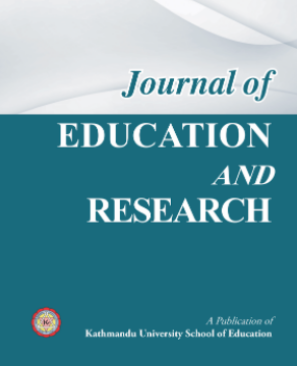
Education for Rural Transformation: The Role of Community Learning Centers in Nepal
Original Article
Journal of Education and Research, Volume 4, Issue 2, 2014, 87-101, https://doi.org/10.3126/jer.v4i2.12391
Publication date: Aug 15, 2014
Views: 622 | Downloads: 451
How to cite this article
APA
In-text citation: (Sharma, 2014)
Reference: Sharma, T. N. (2014). Education for Rural Transformation: The Role of Community Learning Centers in Nepal. Journal of Education and Research, 4(2), 87-101. https://doi.org/10.3126/jer.v4i2.12391
Reference: Sharma, T. N. (2014). Education for Rural Transformation: The Role of Community Learning Centers in Nepal. Journal of Education and Research, 4(2), 87-101. https://doi.org/10.3126/jer.v4i2.12391
Vancouver
In-text citation: (1), (2), (3), etc.
Reference: Sharma TN. Education for Rural Transformation: The Role of Community Learning Centers in Nepal. Journal of Education and Research. 2014;4(2):87-101. https://doi.org/10.3126/jer.v4i2.12391
Reference: Sharma TN. Education for Rural Transformation: The Role of Community Learning Centers in Nepal. Journal of Education and Research. 2014;4(2):87-101. https://doi.org/10.3126/jer.v4i2.12391
AMA
In-text citation: (1), (2), (3), etc.
Reference: Sharma TN. Education for Rural Transformation: The Role of Community Learning Centers in Nepal. Journal of Education and Research. 2014;4(2), 87-101. https://doi.org/10.3126/jer.v4i2.12391
Reference: Sharma TN. Education for Rural Transformation: The Role of Community Learning Centers in Nepal. Journal of Education and Research. 2014;4(2), 87-101. https://doi.org/10.3126/jer.v4i2.12391
Chicago
In-text citation: (Sharma, 2014)
Reference: Sharma, Tanka Nath. "Education for Rural Transformation: The Role of Community Learning Centers in Nepal". Journal of Education and Research 2014 4 no. 2 (2014): 87-101. https://doi.org/10.3126/jer.v4i2.12391
Reference: Sharma, Tanka Nath. "Education for Rural Transformation: The Role of Community Learning Centers in Nepal". Journal of Education and Research 2014 4 no. 2 (2014): 87-101. https://doi.org/10.3126/jer.v4i2.12391
Harvard
In-text citation: (Sharma, 2014)
Reference: Sharma, T. N. (2014). Education for Rural Transformation: The Role of Community Learning Centers in Nepal. Journal of Education and Research, 4(2), pp. 87-101. https://doi.org/10.3126/jer.v4i2.12391
Reference: Sharma, T. N. (2014). Education for Rural Transformation: The Role of Community Learning Centers in Nepal. Journal of Education and Research, 4(2), pp. 87-101. https://doi.org/10.3126/jer.v4i2.12391
MLA
In-text citation: (Sharma, 2014)
Reference: Sharma, Tanka Nath "Education for Rural Transformation: The Role of Community Learning Centers in Nepal". Journal of Education and Research, vol. 4, no. 2, 2014, pp. 87-101. https://doi.org/10.3126/jer.v4i2.12391
Reference: Sharma, Tanka Nath "Education for Rural Transformation: The Role of Community Learning Centers in Nepal". Journal of Education and Research, vol. 4, no. 2, 2014, pp. 87-101. https://doi.org/10.3126/jer.v4i2.12391
ABSTRACT
The main purpose of this paper is to document the potential contributions of the community learning centers in the process of rural transformation and explore how formal, non-formal and informal education are blended for capital formation, empowerment and self sufficiency of the rural communities. Discussions and arguments presented in this paper are based on secondary sources supplemented by a field-based case study.
Nepal's rural communities over the years are facing poverty, deprivation and ignorance. Education and skills for life are particularly important to combat rural poverty and deprivation by developing capacity of rural people to take advantage of available opportunities for reducing economic and non-economic poverty.
Community learning centers (CLCs) as the local educational institutions outside the formal structure, can create various learning options and opportunities, responding to the diverse needs of the rural communities living in a complex situation. Referring to a case study, the paper has advocated that CLCs can be instrumental in rural transformation by offering diverse programs in education and community services such as: early childhood care and development, good quality primary education for all children, second chance basic education for youth, literacy and post literacy programs, women education program, vocational skill development, income generating programs and community development services for improving the quality of life of rural people. The paper further suggested that CLC has potential to offer assistance to the students of local schools in improving their academic achievement and to serve as a local institutional base offering technology-based open and distance learning opportunities and engage rural people in lifelong learning and continuing education.
Nepal's rural communities over the years are facing poverty, deprivation and ignorance. Education and skills for life are particularly important to combat rural poverty and deprivation by developing capacity of rural people to take advantage of available opportunities for reducing economic and non-economic poverty.
Community learning centers (CLCs) as the local educational institutions outside the formal structure, can create various learning options and opportunities, responding to the diverse needs of the rural communities living in a complex situation. Referring to a case study, the paper has advocated that CLCs can be instrumental in rural transformation by offering diverse programs in education and community services such as: early childhood care and development, good quality primary education for all children, second chance basic education for youth, literacy and post literacy programs, women education program, vocational skill development, income generating programs and community development services for improving the quality of life of rural people. The paper further suggested that CLC has potential to offer assistance to the students of local schools in improving their academic achievement and to serve as a local institutional base offering technology-based open and distance learning opportunities and engage rural people in lifelong learning and continuing education.
REFERENCES
---
LICENSE
This work is licensed under a Creative Commons Attribution 4.0 International License.
